Practical tips for parents-to-be from a (very) new mum
Hello! I had my first baby three weeks ago. While it’s all fresh in my mind, I thought it would be worth writing down all the practical things I’ve learned so far, with first time parents-to-be in mind. This isn’t particularly elegant or deep I’m afraid – turns out it’s quite hard to write beautiful prose on broken sleep…!

Some of the advice below was given to me before I had my baby and other bits are things I’ve learned myself in these first few weeks. I don’t claim to be any sort of expert whatsoever – I’m making up motherhood as I go along and completely winging it. I’ve included links to products I’ve liked or found helpful – none of them are affiliate links or sponsored in any way – just my honest recommendations based on the last few weeks.
If you’ve visited this (terribly neglected) blog before, you might be expecting recipes and restaurant reviews. I’ve stripped it back a bit recently and will be writing mostly about parenting, travels, and the odd recipe going forward. Hope you’ll stick with me. Rest assured I’m just as committed to cake as before.
Right, back to the practical tips for parents-to-be from a (very) new mum:
Stuff for you
- Stock up on ibuprofen and paracetamol – you will need it in the weeks after birth, especially if you have any perineal trauma. Be prepared to take it regularly.
- Get a good water bottle and a keep-warm cup. You need to stay hydrated. Hot cups of tea and coffee can become a bit scarce when you’re juggling a baby’s needs – an insulated cup goes a long way! I was very kindly given two by friends, and I use them on rotation!
- NCT antenatal courses are really valuable for both making friends who are also having babies and teaching you some of the key things you need to know about giving birth / the early days with a new baby. However if you can’t afford NCT, there are free resources from the likes of A Mother Place. NCT is also not your only option – Bump and Baby Club and Noobies are worth a look too if they operate in your area. You can find fellow new mums at free meet ups like those run by the Positive Birth Movement.
- Make flapjacks in advance if you can – they really kept me going during labour! My mum made these fruity nutty energy bars. I would make them weekly from 37 weeks onwards next time…
- Batch cook – or fill your freezer with lovely quality ready meals for the early days. That, or see if your own mummy can come stay for a few days at the beginning. Mine stayed for 10 days and took amazing care of us all.
- Buy huge pants. I picked up some multi packs of the biggest pants Primark sell and they’re brilliant. My bump is almost gone but I’m still wearing them…
- Get the massive maternity pads from Boots. They’re lovely and soft and the best ones on the market in my experience. Don’t bother with the little skinny ones (also from Boots). They’re not nearly as soft as good quality sanitary towels and they won’t be nearly absorbent enough at the start. I would switch to Always or similar once the heavy bleeding subsides. But do get the big mattress ones for the first 3 weeks at least – mums, you want maximum comfort and absorbency. I would pop two packets in your hospital bag. Don’t forget to change them regularly too, especially if you’ve got stitches in your fandango.
- Don’t overdo it – however your baby arrives, your body has done something MASSIVE. The placenta has left an open wound inside you, you’re likely to be bruised and sore, and you’re probably knackered. Don’t think you can charge around town for three hours just because the baby is asleep in the pram. Take it easy and be gentle with yourself.
- Just when you think you’ve cracked something… everything will change. Remember there are no routines or set patterns for the first 12 weeks so go with it as best you can and remember you can’t spoil a newborn baby. Snuggle that snufflepuss as long as you want to.

Stuff for baby
- You can never have enough muslins. Seriously. Where are all the bastard muslins when you need them? I have stationed them within reaching distance of every spot in the house and I still don’t think we have enough. Good to have giant ones as well as the normal size ones too. My favourite ones are the Aden + Anais ones but I also love the Aldi ones (which you can buy during the baby Specialbuy events). The big ones can double up as swaddles and the smaller ones are essential for mopping up sick, snot, or breastmilk. Or all three at once if you’re really lucky.
- Get sleepsuits that have poppers (or better yet, zips!) up the front. They’re much easier to get on and off than the over-the-head ones. My favourite ones come from John Lewis.
- Also, make sure you buy enough newborn vests and sleepsuits. We had to go buy more when he was a week old! You will be gifted lots of 0-3 or (more commonly) 3-6 months outfits but unless you have a 10lb+ baby, they’re going to be in newborn clothing for around a month. So make sure you have enough – I would say at least 10 sleepsuits and 10 vests, ideally more if you don’t want to be doing washing every day (which may happen anyway).
- A side sleeping cot is the bee’s knees. It’s so comforting to be able to reach over to check on the baby while in bed and makes whipping him or her in and out for night feeds so much easier. We chose the Tutti Bambini CoZee but the Snuz Pod and Chicco ones are also popular choices.
- If you have a baby boy, get some lovely soft flannels and have two at every changing station. They are very handy if your little man decides to wee while you’re changing his nappy. Which is hilarious at first but less funny when you covers you, the wall, his clothes, or his own face in wee. I drape the flannel over his tummy to protect his clothes and can move it, ninja-like, if I need to catch a wee. It’s like a goddamn fountain if you’re not careful.
- Pampers Premium or Pampers Pure are really lovely nappies – especially for the first few weeks as they have a very clear colour changing line to indicate if your baby has peed or not. This can be really helpful if you’re not sure and want to ensure they are weeing regularly. If you don’t want to remortgage your house or sell a kidney to fund expensive nappies, the Aldi Mamia nappies are also really good.
- Buy non-bio washing powder/liquid/tabs for the baby’s clothes as it’s less likely to irritate their skin.
- My sister introduced me to papaya ointment to prevent nappy rash. It smells really nice and has been brilliant so far. It’s expensive but it’s really effective and lasts a while.
- Don’t let anyone with a cold sore kiss the baby and ask friends or family with colds to stay away until they’re feeling better. Our son caught a cold very quickly after he arrived and listening to him breathing through a snotty nose was quite heartbreaking. You don’t need that extra stress.
- Don’t have visitors until you’re absolutely ready and make sure people are instructed to bring food, make their own cups of tea, and leave after an hour or so. Don’t have too many visitors in one day. You WILL be tired and if you stack your diary with no gaps for naps then you’ll be absolutely shattered by the evening.

Birth
- Ultimately, my main take away from giving birth is that you have to stay open minded and flexible. There are so many variables and no guarantee which way things will go – keeping an open mind is key to avoiding disappointment. That said, it’s ok to feel sad if you don’t get to have the birth you want. Write a birth plan, make sure your birth partners understand what’s important to you, and be prepared to roll with the punches when it comes to crunch time.
- Choose birth partners you can trust completely. For me, that was my husband and my mum. Labour strips you raw in every way so you need a person or people by your side that can keep you calm, centred, focused, and positive. It’s also really important that you all talk about how you feel beforehand – so if anyone in the room has worries, try to air them beforehand. You don’t want to suddenly find out your loved one is scared of something in your birth plan while you’re in the thick of it. Make sure the people in the room understand your birth plan so they can advocate for you if you’re unable to for any reason.
- No matter what you’re thinking re: a birth plan, a really useful resource is Evidence Based Birth. It’s completely unbiased advice so it’s really worth a look if you’re getting a bit overwhelmed with all the information and options about birth. I used it to research the pros and cons of water birth, which meant I was able to make an informed choice about my Plan A.
- I did a hypnobirthing course and found it really valuable in helping me to lose my fear of giving birth, stay calm during labour, and focus on my breathing. It also really helped my husband so it’s good for dads as well as mums. As with everything, take it with a pinch of salt – hardcore hypnobirthers might tell you that you can simply breathe your baby out. *insert raised eyebrow emoji* Go in with realistic expectations but do be prepared to practise the breathing and relaxation exercises if you decide it’s something you want to try. I didn’t quite breathe my baby out but the breathing exercises gave me something to focus on when it mattered and I was able to stay calm throughout.
- If you do NCT they will talk to you about all the pain relief options and you may come away feeling as though you should say no to certain drugs. Remember that your midwives will know your situation best so speak to them at the time and make informed decisions. I came away from NCT feeling as though having pethidine was the worst thing I could do for my baby and ultimately it was a really critical part of my labour – I’m so glad I had it! And my baby was absolutely fine.
- Remember how important rest is in early labour. I arrived at the hospital to hear I was 3cm dilated. I was a bit disappointed it wasn’t more but as my mum reminded me, it’s basically a third of the way there. Once I had pethidine, my body was able to relax much more and that was crucial for making progress. Don’t underestimate the power of relaxing into your labour. Or the power of the pethidine. It helped me psychologically as much as physically.
- Read positive birth stories! I found so many good accounts on Instagram in the weeks before I gave birth. A Mother Place, Tell Me a Good Birth Story, A Modern Midwife, Tranquil Birth, Birth Without Fear, Positive Birth Movement, and others are all worth a follow to help you feel excited and confident ahead of giving birth. Stop people from telling you horror stories if you don’t find them helpful (which I really didn’t) – you can just politely ask them to save their story for after you’ve gone through it. If all else fails, ask them if they regret it – I guarantee no parent will tell you they wish they hadn’t had babies.
- If you want to know what childbirth feels like… Nell Frizzell writes about it far more elegantly than I ever will. I will write my own birth story at some point but for now let me summarise by saying it was an incredibly positive experience and I would do it again tomorrow. It’s completely worth it.
- I will write a separate post about what I’ve learned emotionally since becoming a mother, but let me just say that it is completely normal to cry a lot in the days after you give birth. The hormones are completely bonkers and you will be riding all sorts of emotions, while dealing with exhaustion and broken sleep. Be kind to yourself. Stock up on chocolate and tissues. And know that sobbing over your son’s umbilical cord dropping off is completely normal.
- If you have stitches afterwards, be prepared that they can itch a bit when they dissolve. Fun!
- You may be worried about pooing during labour. Don’t be. It will probably happen, you may not notice, and you definitely won’t care at the time. Trust that the hormones and physical sensations of labour will completely reprioritise your worries. Pooing is not one of them.

Breastfeeding
- If your hospital offers support with breastfeeding on the post-natal ward, take it. We stayed 36 hours in hospital and it was massively helpful getting support with learning to feed and growing my confidence.
- Don’t bother to buy an expensive electric breast pump before you give birth. I have used mine once and hated it. I find a small silicone haakaa pump much gentler and far more pleasant to use. You can always decide to buy or hire one later down the line and most hospitals have them available to borrow if you need to express in the early days. Speak to your midwife to check!
- The only breast pads to bother with are Lansinoh ones. They’re super absorbent with a core a bit like nappies, so they’re really brilliant. None of the other brands are as good in my experience so far. They have sticky bits to stick to your bra but these can snag on your nips as you’re hoiking your boobs in and out – a tip from my sister is that you don’t actually need to stick them in there. They stay put whether they’re stuck down or not. You can also get reusable ones though these might not be very convenient if you’re out and about.
- Speaking of nursing bras, I have found the Cake ‘Sugar Candy’ nursing bra to be the most comfortable. The Freya Chi nursing bra is comfy during pregnancy but a bit of a faff for breastfeeding. JoJo Maman Bebe do really comfy sleep nursing bras. I would definitely aim to have at least four comfy nursing bras – two for sleeping and two for daytime. Mums need to be comfortable so do invest in quality bras if you can.
- Another Lansinoh must-have is their nipple cream (which also makes a great lip balm). You don’t have to wipe it off before feeding baby which makes it super convenient for mums. I would have a couple of tubes close to where you typically breastfeed (if that’s what you choose to do). It’s a godsend for sore nips and you will definitely need it if you suffer from chapped or cracked areolas.
- If you need to use nipple shields – which are brilliant if you’ve got sore / flat / inverted nips – the Medela nipple shields are really good.
- If your hospital does an antenatal class on breastfeeding, go to it. I found it really helpful in understanding the physical process of breastfeeding and that really helped me once I started doing it myself. My hospital also teaches you how to harvest colostrum, which is incredibly handy in the first couple of days after birth.
- Find out where all the local breastfeeding drop ins are and don’t be afraid to go along. There is nothing to be embarrassed about – breastfeeding is not a skill we are born with so you and baby both have to learn together. It’s a fair bit of trial and error in my experience but it gets easier. Don’t put up with awful pain – there may well be something you can do to help make it better for you and bubs.
- Dealing with engorgement when your milk comes in is a right arse. I expressed using the haakaa pump and used Lansinoh Therapearl (like hot water bottles for your knockers) to soothe the discomfort.
Are you a new parent? What practical things have you learned since you had your baby?

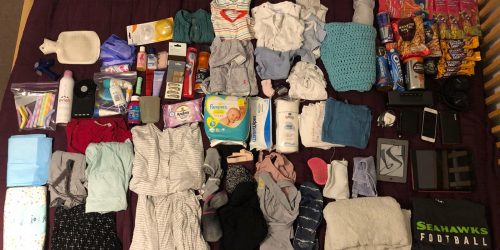
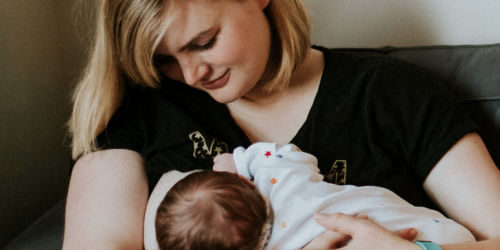
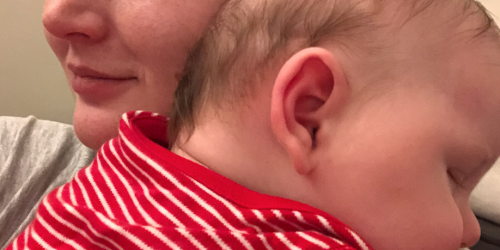
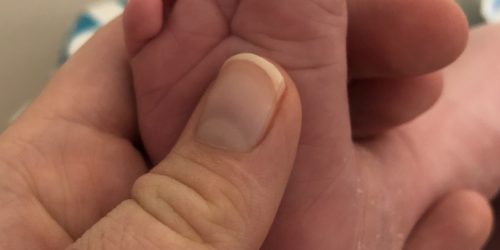

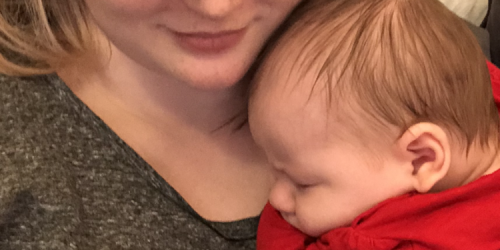
Thank you! I’m due in two months and the resources and tips are helpful for adding to my bag. Going for most natural delivery possible! Congratulations!